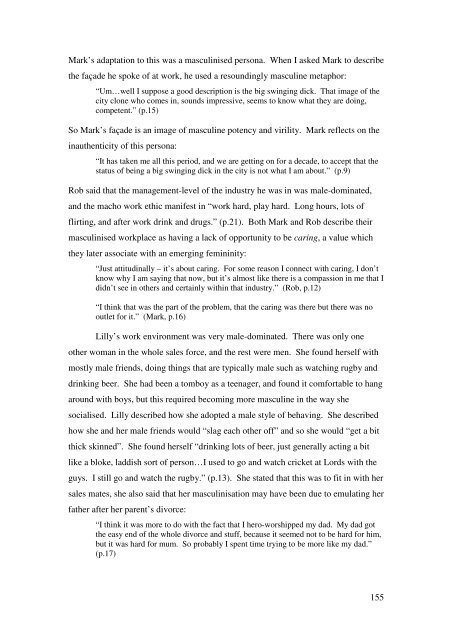DEVELOPMENTAL CRISIS IN EARLY ADULTHOOD: A ...
DEVELOPMENTAL CRISIS IN EARLY ADULTHOOD: A ...
DEVELOPMENTAL CRISIS IN EARLY ADULTHOOD: A ...
Create successful ePaper yourself
Turn your PDF publications into a flip-book with our unique Google optimized e-Paper software.
Mark’s adaptation to this was a masculinised persona. When I asked Mark to describe<br />
the façade he spoke of at work, he used a resoundingly masculine metaphor:<br />
“Um…well I suppose a good description is the big swinging dick. That image of the<br />
city clone who comes in, sounds impressive, seems to know what they are doing,<br />
competent.” (p.15)<br />
So Mark’s façade is an image of masculine potency and virility. Mark reflects on the<br />
inauthenticity of this persona:<br />
“It has taken me all this period, and we are getting on for a decade, to accept that the<br />
status of being a big swinging dick in the city is not what I am about.” (p.9)<br />
Rob said that the management-level of the industry he was in was male-dominated,<br />
and the macho work ethic manifest in “work hard, play hard. Long hours, lots of<br />
flirting, and after work drink and drugs.” (p.21). Both Mark and Rob describe their<br />
masculinised workplace as having a lack of opportunity to be caring, a value which<br />
they later associate with an emerging femininity:<br />
“Just attitudinally – it’s about caring. For some reason I connect with caring, I don’t<br />
know why I am saying that now, but it’s almost like there is a compassion in me that I<br />
didn’t see in others and certainly within that industry.” (Rob, p.12)<br />
“I think that was the part of the problem, that the caring was there but there was no<br />
outlet for it.” (Mark, p.16)<br />
Lilly’s work environment was very male-dominated. There was only one<br />
other woman in the whole sales force, and the rest were men. She found herself with<br />
mostly male friends, doing things that are typically male such as watching rugby and<br />
drinking beer. She had been a tomboy as a teenager, and found it comfortable to hang<br />
around with boys, but this required becoming more masculine in the way she<br />
socialised. Lilly described how she adopted a male style of behaving. She described<br />
how she and her male friends would “slag each other off” and so she would “get a bit<br />
thick skinned”. She found herself “drinking lots of beer, just generally acting a bit<br />
like a bloke, laddish sort of person…I used to go and watch cricket at Lords with the<br />
guys. I still go and watch the rugby.” (p.13). She stated that this was to fit in with her<br />
sales mates, she also said that her masculinisation may have been due to emulating her<br />
father after her parent’s divorce:<br />
“I think it was more to do with the fact that I hero-worshipped my dad. My dad got<br />
the easy end of the whole divorce and stuff, because it seemed not to be hard for him,<br />
but it was hard for mum. So probably I spent time trying to be more like my dad.”<br />
(p.17)<br />
155
















